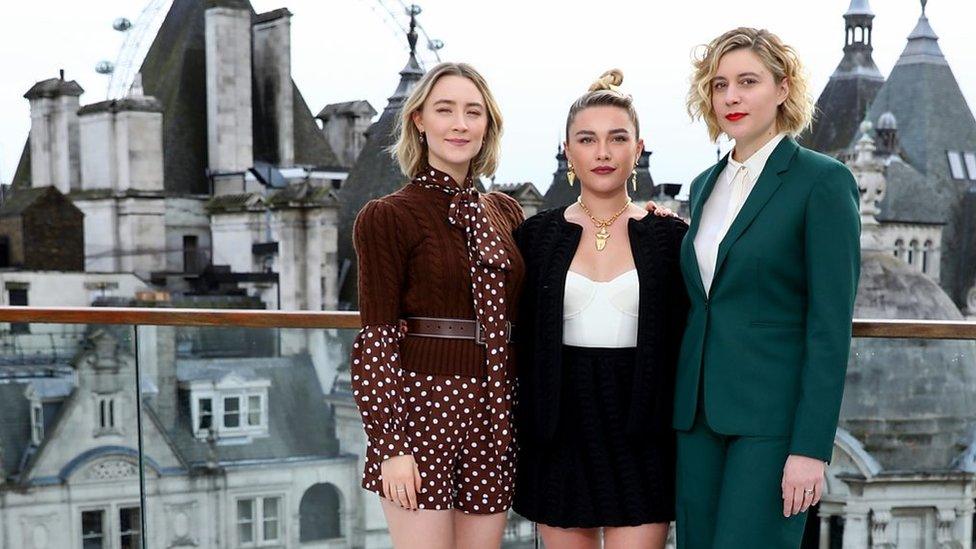Little Women: 'The superhero origin story of girls who wanted more'
- Published
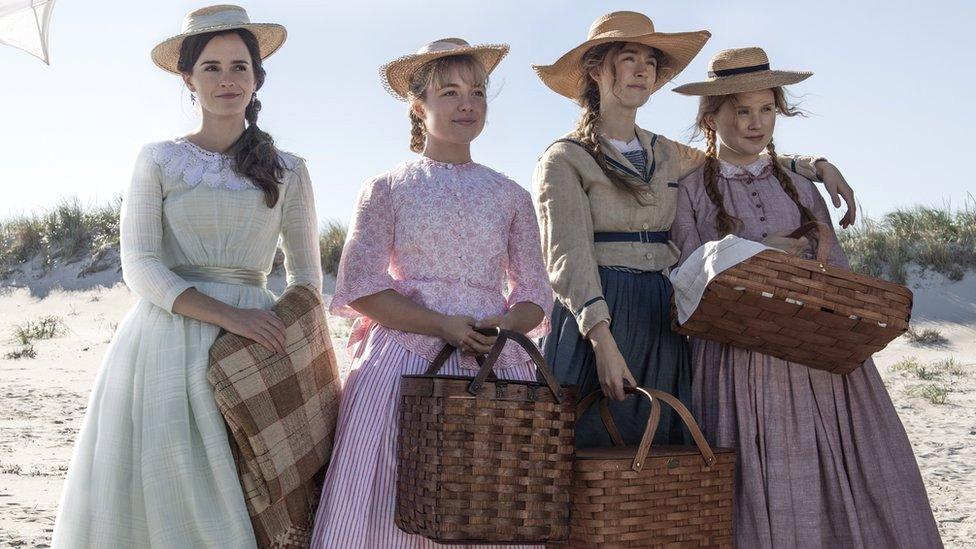
L-R: Emma Watson (Meg), Florence Pugh (Amy), Saoirse Ronan (Jo) and Eliza Scanlon (Beth)
Director Greta Gerwig is surprised her new film Little Women actually made it to the big screen.
"It takes place over 10 years, has eight different plot lines, there are two timelines, and lots of characters," she tells BBC News, highlighting one of several reasons she didn't think it would get the green light.
"I feel very lucky and very grateful that this even got made, because it just seems like so unlikely - studios don't make period movies about sisters based on books. It's a very unusual movie to have happen."
She may have been underestimating the affection audiences feel for Louisa May Alcott's novel, given that there have already been six film adaptations.
But the most recent one was released in 1994, and there's no guarantee moviegoers will be keen to see a new take on a novel which was written in the late 1860s.
This iteration of Little Women has all the ingredients for box office success, at least. A starry cast (Emma Watson and Meryl Streep among them), a Christmas holiday release date and awards season momentum.
The film tells the story of four impoverished sisters whose father is away working as a pastor in the American Civil War. It follows them and their surrounding friends, family and neighbours as they grow older and start to carve out lives for themselves as adults.
Ronan, Pugh and Gerwig discuss Little Women in a separate interview with Radio 4 Today
The movie's cast and director argue the issues raised by Little Women still resonate nearly 150 years after the book's publication - even if the societal context has changed.
"The themes underneath the book are authorship, ownership, women, money, art and ambition, and those are totally modern, totally pressing themes," says Gerwig, who also directed the Oscar-nominated Lady Bird.
"And of course, there's this timeless love story of these sisters and this mother, but also, it's these themes that I think were so powerful to me. And I think going back to the source - it's almost like the superhero origin story of girls who wanted more."
In the book, Meg, Jo, Beth and Amy are pressured by Aunt March (Streep) to marry rich so they will be well looked after for the rest of their lives.
That pressure may not be what it was at the time the book was written, but the battle for a woman being allowed to make her own lifestyle choices without judgement rumbles on.
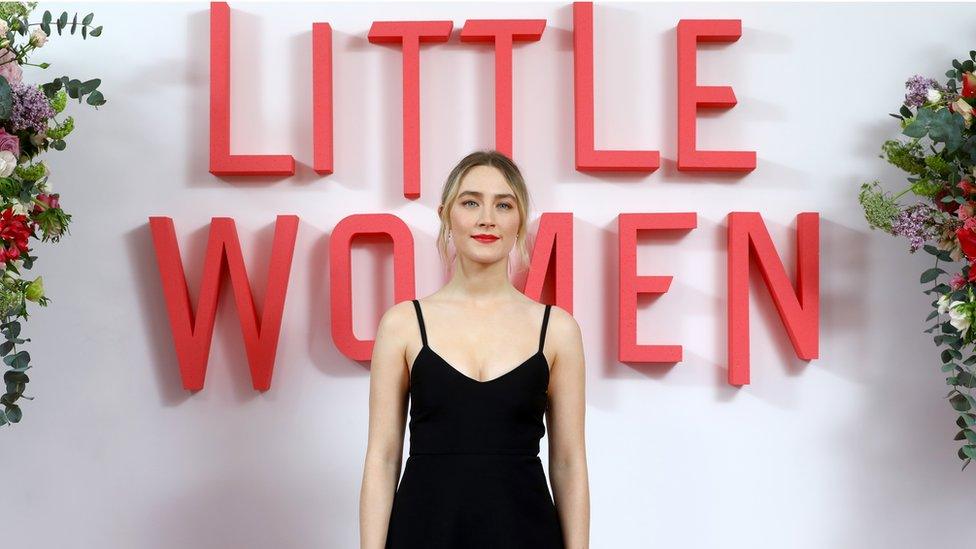
Saoirse Ronan, who plays Jo, previously worked with director Greta Gerwig on Lady Bird
The four sisters all choose different career and lifestyle paths by the end. Jo, who is played in this adaptation by Saoirse Ronan, is perhaps the most intriguing character. She fights against the pressure to marry - but also acknowledges candidly how isolated she feels being single.
Ronan says: "I love the fact that I got to play a scene where the female heroine also admits to being lonely and sort of lost, and has dedicated her life to this one thing, but recognises at a certain point in her life that there was a price to pay for that."
Jo's sister Meg (Emma Watson), on the other hand, not only chooses to marry, but opts for a poor man she's fallen in love with - much to her aunt's horror.
"I've always wanted to have kids, I've always wanted to have a family," explains Ronan. "And I love that there's this strength there from Meg to own that decision and that she's actually quite empowered by that.
"And I think it's a testament to Louise's writing, and then also Greta's take on it, that these four girls are very different and they're doing very different things. And as Meg says in the book, 'it doesn't make my decision any less important'."
The new film adaptation, which is released in the UK on Boxing Day, has been warmly welcomed by critics.

What do the critics say?
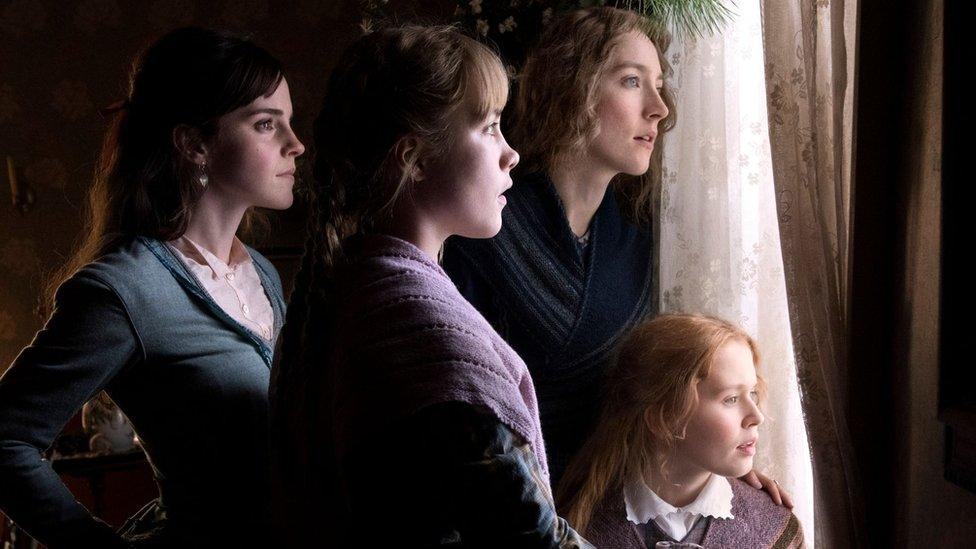
Empire's Helen O'Hara awarded it five stars, external, calling it "the definitive big-screen Little Women".
"This adaptation of an American classic takes an overly familiar story and makes it immediate and important and daring," she said. "In a year packed with fascinating films about women, here's the grandmother of them all."
"The time shifts can be jarring," noted The Washington Post's Ann Hornaday., external "But once the movie finds its feet, the characters reveal themselves."
"This intelligent, exuberantly affectionate iteration of the classic novel doesn't mess with the bones of Alcott's beloved work... in Gerwig's capable hands, though, even the most familiar contours of Little Women feel new."
However, Screen Daily's Fionnuala Halligan described it, external as "an often cloyingly self-satisfied, over-stuffed riposte to the endless Jane Austen adaptations from across the pond".
She credited Pugh with boosting the film. "It's only when Pugh gets her hands on spoiled younger sister Amy and opens up that often-overlooked strand of the work that the film seems to find relevance beyond its pretty fussiness and that warm, wintery - decidedly Christmassy, somewhat pleased-with-itself - glow."

Florence Pugh, who plays Amy, agrees it's important each of the sisters' choices is treated with respect. "Each [decision] is as important as the next," she says. Through Amy, we see just how dire it was for women and how there weren't very many options at all.
"Even someone who wants to be an artist [Amy] knew that she couldn't earn enough money to support her family. It's very easy to appreciate what Jo did because she's a tomboy, she's fun, she's different. She's not like other girls and she earns her own money.
"But I think it's important that we are constantly reminded that it wasn't very fair back then, they didn't have very many options. And if you're a woman, and if you were beautiful, and if you had a dress, your safest option was to find someone who could support you in your life and your children. And actually, what Jo was doing was pretty bizarre and foolish to do because it was completely unheard of."
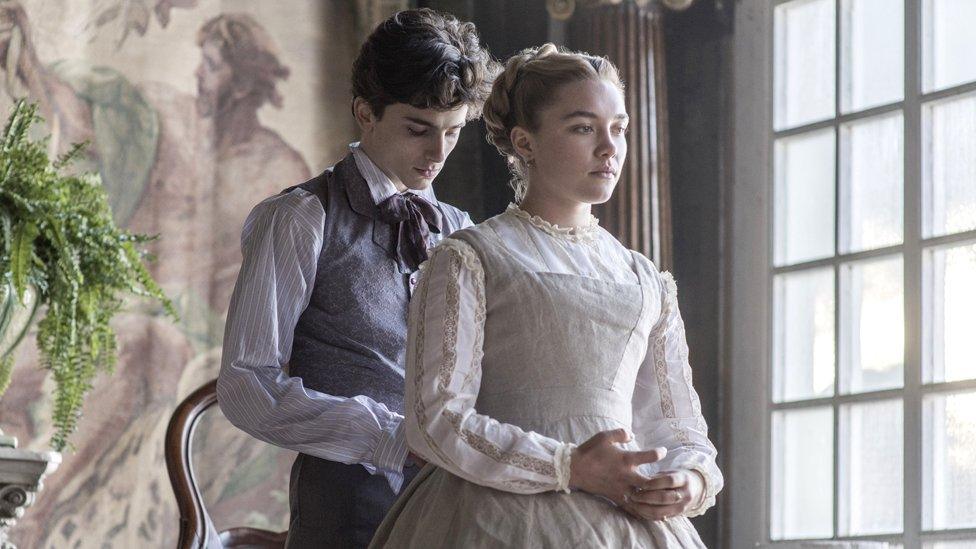
Timothee Chalamet plays Laurie - a love interest for two of the sisters
Little Women is notable for the fact it presents a cast with principle female roles which are equal in weight. While Bridesmaids and Pitch Perfect have been box office smashes, both focused on a couple of select main characters.
"It's only over the last four years or so we've actually started to see like an ensemble cast filled with women that all have equally interesting, important roles in the same project," says Ronan.
"And what that's done already is it's just eliminated some of that competition and that sort of savagery that we're made to feel when there's one female role a year that everybody wanted. That's only changed in the last few years. And it's amazing how suddenly there's just a platform for you to allow support to be a part of your work."

Follow us on Facebook, external, or on Twitter @BBCNewsEnts, external. If you have a story suggestion email entertainment.news@bbc.co.uk, external.
- Published17 December 2019
